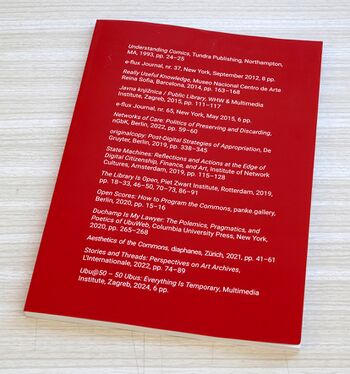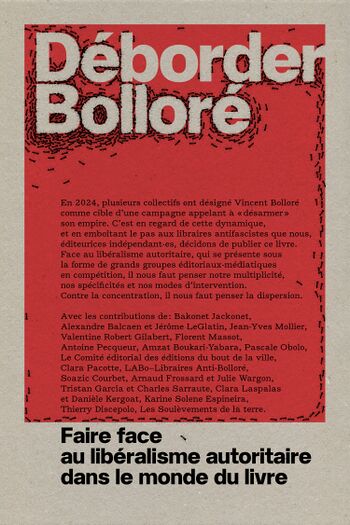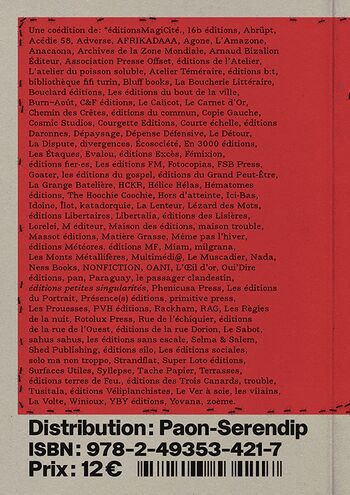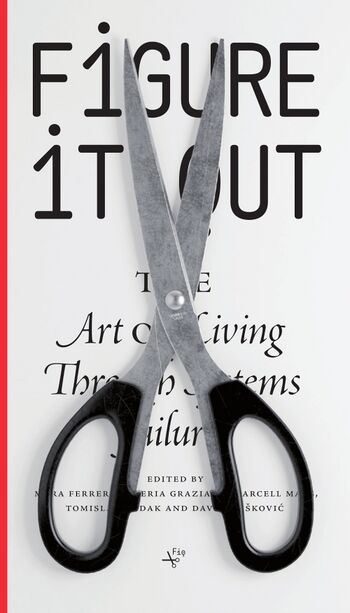Log2
File:Careful A Repertorium on Shadow Library Practice 2025.pdf
Published on the occasion of Careful vs Careless: Library Custodians and Artificial Readers and Library Making as Practice at distro, Basel, 5–17 November 2025. With the Library of Inclusions and Omissions, Monoskop, The Piracy Project, Public Library / Memory of the World, a.o. Organised by Lucie Kolb and Maria Maddalena Lenzi.
"Large Language Models have, in a sense, created the ultimate (un)ideal readers for electronic libraries. By treating e-libraries as vast training datasets, algorithmic scraping has become both the fulfilment and the ruin of a core dream in public library culture: that access to books should be free and unlimited for all. AI systems read everything and nothing, at inhuman scale and speed — extracting patterns and selling what they pretend to know as consequence. What once symbolised a democratic promise now risks feeding extractive logics that empty reading of meaning.
So, why should we care — and if we do, how can we put that care into practice?
The ‘Careful VS Careless’ exhibition centres a new conversation between custodians of radical public libraries, known as ‘shadow libraries’. Organised around that conversation are a mixture of symbolic and tactical gestures that help people to think and act carefully in relation to the infrastructures of public knowledge systems."
Compiled by Dušan Barok, Marcell Mars, Tomislav Medak, Nick Thurston
Careful: A Repertorium on Shadow Library Practice distro, Basel, November 2025 [134] pages PDF (22 mb)
2025-11-5
File:Vertical Atlas 2022.pdf
"How to navigate the rapidly changing digital geopolitics of the world today? How do we make sense of digital transformation and its many social, political, cultural, and environmental implications at different locations around the world?
Vertical Atlas brings together the insights of a diverse group of internationally renowned artists, scientists and technologists from different backgrounds and places. From an investigation into the lithium mines in the Democratic Republic of Congo to maps of the fiber-optic submarine cables in the Atlantic and the ride-hailing platforms of China.
Vertical Atlas is not a classic atlas that depicts the world in a uniform manner and it is not a simple collection of traditional maps. This book is a tool that enables comparisons, connections and contradictions between different and diverse visions, realities and worlds – through newly commissioned diagrams, interviews, essays and works of art by leading experts from around the world."
Contributions by: Sophia Al Maria, Heba Y. Amin, Lotte Arndt, Benjamin H. Bratton, Kévin Bray, James Bridle, Ingrid Burrington, Adriana Bustos, Ben Cerveny, Guo Cheng, Chimurenga, Cristina Cochior, Sounak Das, Data Justice Lab (Philippa Metcalfe, Fieke Jansen), Pablo DeSoto, Alex Destoop, Marjolijn Dijkman, DISNOVATION.ORG, Maarten Vanden Eynde, Cao Fei, Shuang Lu Frost, Maya Indira Ganesh, Pélagie Gbaguidi, GCC Group, Geocinema (Asia Baz Qudyrieva, Solveig Suess), John Gerrard, Oulimata Gueye, Camille Henrot, Femke Herregraven, Yuk Hui, Sanneke Huisman, Victoria Ivanova, Vladan Joler, Isaac Kariuki, Francois, Knoetze, Srinivas Kodali, Bogna Konior, Lukáš Likavčan, Abu Bakarr Mansaray, Svitlana Matviyenko, Emo de Medeiros, Metahaven, Dorine Mokha, Jean Katambayi Mukendi, Edmond Musasa, Leu N’seya, Katja Novitskova, Trevor Paglen, Alice Piva, Chen 'Stanley' Qiufan, Nii Quaynor, Elia Rediger, Tabita Rezaire, Lucas Rolim, Bassem Saad, Nanjira Sambuli, Georges Senga, Nzilani Simu, Andrej Škufca, Ksenia Tatarchenko, Suzanne Treister, Unknown Fields, Jordi Vallverdú, Richard Vijgen, Sarah Waiswa, Zhan Wang, Kedolwa Waziri, Mi You, Qiu Zhijie, Dan Zhu.
Edited by Leonardo Dellanoce, Amal Khalaf, Klaas Kuitenbrouwer, Nanjala Nyabola, Renée Roukens, Arthur Steiner, Mi You
Vertical Atlas Publisher ArtEZ Press, Arnhem, and Hivos, 2022 ISBN 9789491444692 357 pages PDF (65 mb)
2025-11-3
File:Deborder Bollore 2025.epub
"Une publication multiformat coéditée par plus d’une centaine d’éditeurices indépendant·es, disponible à la vente en librairie et en libre diffusion sur deborderbollore.fr aux formats web, EPUB et PDF.
Dans le contexte de la campagne Désarmons Bolloré, et en emboîtant le pas au boycott appelé par les « libraires antifascistes », nous, éditeurices indépendant·es, coéditons collectivement cette publication multiformat pour prendre part depuis notre secteur à la réflexion générale sur le démantèlement de l’empire Bolloré.
Les contributions mettent en avant la pensée de chercheureuses, d’imprimeureuses, d’éditeurices et de libraires qui analysent et/ou subissent les dynamiques de concentration et d’extrême droitisation du marché. Chacun·e tente de formuler, depuis sa position respective, des réponses à cette question urgente : comment faire face au libéralisme autoritaire dans le monde du livre ?
En tant qu’éditeurices indépendant·es, nous sommes indirectement visé·es par le projet totalisant de Bolloré car nos structures sont des espaces qui permettent la fabrique de contre-récits et la circulation de voix minoritaires. Face à de grands groupes monopolistiques qui filtrent les récits, il nous faut lutter pour préserver ces espaces essentiels de résistance et qui — n’en déplaise aux prophètes·ses du « grand remplacement » et aux croyant·es du « lobby LGBTQ+ » — se font rares.
La forme de cette publication multiformat part du constat suivant : si, à lui seul, Vincent Bolloré se montre capable de mobiliser des moyens logistiques et médiatiques colossaux pour mener sa « guerre civilisationnelle », alors nous devons, de notre côté, mobiliser l’entièreté de notre réseau d’éditeurices, de diffuseurs, de libraires et de relais médiatiques pour y résister. Face à la concentration par les grands groupes, faisons jouer la multiplicité et la singularité caractéristique du monde du livre indépendant.
Bolloré, par l’intermédiaire d’Hachette, est un acteur majeur de la concentration capitalistique du milieu éditorial, mais il n’est pas le seul instigateur de cette dynamique. C’est la structure même du monde du livre qui permet à de grands groupes de s’accaparer 90 % du marché de l’édition. Ainsi avons-nous décidé de « déborder Bolloré », c’est-à-dire de dépasser la figure, certes exubérante du personnage, pour comprendre, dans un premier temps, les mécanismes avec lesquels il opère et comment, dans un second temps, les déjouer depuis nos positions d’acteurices de l’édition indépendante."
Déborder Bolloré: faire face au libéralisme autoritaire dans le monde du livre Collectif éditorial Déborder Bolloré, 2025 Creative Commons BY-NC-ND 4.0 International License ISBN 978-3-0361-0138-5 EPUB, Web, PDFs, Markdown
2025-7-23
File:Figure it Out The Art of Living Through System Failures 2024.pdf
"Figure it Out (FIO) is an artistic and research project engaging practices and phenomena of coping, tinkering, making-do, and circumventing exclusions that are developed by marginalized, underserved, discriminated, and vulnerable people. Gendered, racialized, bordered, disabled, and exploited, these constituencies are often forced to develop tools and strategies that are considered unacceptable to the institutions of the system. Sometimes these tools and strategies are forged out of necessity, of survival, sometimes to exercise rights or to secure access to basic services available to those deemed more “deserving”. Other times, these coping mechanisms reclaim rest, beauty, or pleasure as part of a dignified life. What FIO practices and phenomena have in common is that they are not about scamming peers or those more vulnerable than them. Instead, they are practices that take issue with formalized, normative forms of oppression (state, welfare institutions, corporations, workplace, credit, housing, utilities etc.) that have sets of rules and conditions of access that specific populations or individuals cannot meet. They are actions directed at the conditions that produce and reproduce systemic violence and which reformist approaches aim to fix in the long run. FIO practices instead inhabit different temporalities from the perspective of those who cannot and will not wait. In their urgency, they open up spaces where different ethical practices can emerge, where knowledges are passed on in ways that complicate claims to a universal and transparent public sphere."
Edited by Mara Ferreri, Valeria Graziano, Marcell Mars, Tomislav Medak and Davor Mišković
Figure it Out: The Art of Living Through System Failures Publisher Drugo more, Rijeka, November 2024 ISBN 9789539976482 108 pages PDF (1.4 mb) Zine
2025-7-19
File:Hofman Socialism Now Singing Activism after Yugoslavia 2025.pdf
by Ana Hofman
Socialism Now traces the activities of the self-organized choirs that have emerged in the region in the twenty-first century. These collectives have been recuperating Yugoslav and international revolutionary, partisan, and workers’ songs and performing them alongside a contemporary socially engaged repertoire. Their singing activism demasks the privatization, dispossession, and political and social fragmentation that, instead of a promised capitalist dreamland, have shaped lives in the region after the dissolution of socialist Yugoslavia. Combining historical and ethnographic approaches, the book offers a nuanced account of collective singing as a way of organizing against the adverse effects of neoliberal capitalism in its potentialities and limits. Taking a perspective on the politics of music and sound outside the usual understanding of social justice or social change, Socialism Now revalorizes the “lost” historical knowledge and lived experiences from the former Second World. The book’s central concept, strategic amateurism, proposes the key role of nonprofessional, communal leisure musical activities in building the structures for anti-capitalist organizing.
Socialism Now: Singing Activism after Yugoslavia Publisher Oxford University Press, May 2025 ISBN 9780197576304 Creative Commons BY-NC-ND 4.0 License xiii+193 pages PDF (15 mb), HTML, PDFs
2025-7-18





